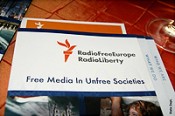NEWSLINK: Radio Liberty Forced to Make Hard Choices in Russia

(Radio Liberty Forced to Make Hard Choices in Russia – Wall Street Journal – Letter to the Editor – Steven Korn – January 7, 2012 – click here for full letter)
In a Wall Street Journal letter to the editor, Radio Free Europe/ Radio Liberty president Steven Korn discusses changes in how RFE/RL tries to reach listeners in Russia, including a shift from conventional radio to e-based methods, in the face of steps taken by the Russian government:
… A few months ago I made the decision that we needed to reconfigure Radio Liberty operations in Russia in light of the new realities confronting us: Russian authorities had taken steps that were about to close down our medium-wave radio broadcasts serving the area around Moscow.
This followed years of actions by authorities to end in-country AM, FM, UKV and cable re-broadcasting efforts. As a consequence, between 2002 and 2012, our share of weekly adult listeners dropped from 5.2% to 0.8%.
After exploring all possible ways of continuing our in-country broadcasting (our external short wave and satellite broadcasts continue), it became clear that expanding our digital-media efforts was the best way to revitalize and continue Radio Liberty’s long-time mission of providing surrogate news and information in the increasingly restrictive Russian press landscape. Doing so required making difficult changes to Radio Liberty’s staff and programs in Russia, placing our resources where our Russian audience could best access them namely in online, and multimedia digital communications.
RFE/RL reportedly has determined that a majority of Russians now get their news online, prompting a changed technological focus that apparently also has impacted staffing:
Research showed that more than 50% of Russians go online weekly to gather news and information supported this strategy; the need for change was reinforced by a slide in Web audiences from 1.3% to 0.3% between 2010 and 2012.
To carry it out, we had to lay off a number of Russian-based staff, in some cases because of the shift from radio that had been forced on us by Russian authorities and in others because it had become clear their skills were not well suited to the demands of our new approach.
Addressing what he called a wrenching process of staff changes, Korn indicated that severance packages were provided beyond what was required by RFE/RL policy or relevant laws.
Masha Gessen is the new director of RFE/RL’s Russia service, praised by Korn on multiple levels.
